At the dialogue trigger script top I added a new List type string:
using System.Collections;
using System.Collections.Generic;
using System.IO;
using System.Linq;
using UnityEngine;
public class DialogueTrigger : MonoBehaviour
{
public List<string> conversation = new List<string>();
public List<Dialogue> dialogue = new List<Dialogue>();
[HideInInspector]
public int dialogueNum = 0;
private bool triggered = false;
private List<Dialogue> oldDialogue;
private void Start()
{
//oldDialogue = dialogue.ToList();
}
public void TriggerDialogue()
{
if (triggered == false)
{
if (FindObjectOfType<DialogueManager>() != null)
{
FindObjectOfType<DialogueManager>().StartDialogue(dialogue[dialogueNum]);
dialogueNum += 1;
}
triggered = true;
}
}
private void Update()
{
if (DialogueManager.dialogueEnded == true)
{
if (dialogueNum == dialogue.Count)
{
return;
}
else
{
FindObjectOfType<DialogueManager>().StartDialogue(dialogue[dialogueNum]);
DialogueManager.dialogueEnded = false;
dialogueNum += 1;
}
}
}
}
Then in the editor script:
using System.Collections;
using System.Collections.Generic;
using UnityEditor;
using UnityEditorInternal;
using UnityEngine;
[CustomEditor(typeof(DialogueTrigger))]
public class DialogueTriggerEditor : Editor
{
private SerializedProperty _dialogues;
private SerializedProperty _conversations;
private void OnEnable()
{
// do this only once here
_dialogues = serializedObject.FindProperty("dialogue");
_conversations = serializedObject.FindProperty("conversation");
}
public override void OnInspectorGUI()
{
//base.OnInspectorGUI();
serializedObject.Update();
_conversations.arraySize = EditorGUILayout.IntField("Conversation Size", _conversations.arraySize);
// Ofcourse you also want to change the list size here
_dialogues.arraySize = EditorGUILayout.IntField("Dialogue Size", _dialogues.arraySize);
for (int x = 0; x < _conversations.arraySize; x++)
{
for (int i = 0; i < _dialogues.arraySize; i++)
{
var dialogue = _dialogues.GetArrayElementAtIndex(i);
EditorGUILayout.PropertyField(dialogue, new GUIContent("Dialogue " + i), true);
}
}
// Note: You also forgot to add this
serializedObject.ApplyModifiedProperties();
}
}
I'm doing a loop of the _conversations on the loop of the _dialogues. But this is not what I wanted.
I want that in the Inspector on the top level there will be only "Conversations Size".
If the Conversations Size is 0 there is nothing. But if the Conversations Size for example is 5.
Then it will create 5 Conversations(Conversation 1, Conversation 2....Conversation5). And under each Conversation there will be a Dialouge Size and then I can make many dialogues per conversation.
That way it will be easier to identify later the conversations and dialogues. Instead as before that there was one long dialogues.
I added the conversation List before that it was just without the conversation/s and working fine but now I want to add the conversations. So each conversation will have it's own dialogues.
This is the scripts according to the solution:
Created the class:
using System.Collections;
using System.Collections.Generic;
using UnityEngine;
[System.Serializable]
public class Conversation
{
public string Id;
public List<Dialogue> Dialogues = new List<Dialogue>();
}
Then the trigger script:
using System.Collections;
using System.Collections.Generic;
using System.IO;
using System.Linq;
using UnityEngine;
public class DialogueTrigger : MonoBehaviour
{
public List<Conversation> conversations = new List<Conversation>();
public List<Dialogue> dialogue = new List<Dialogue>();
[HideInInspector]
public int dialogueNum = 0;
private bool triggered = false;
private List<Dialogue> oldDialogue;
private void Start()
{
//oldDialogue = dialogue.ToList();
}
public void TriggerDialogue()
{
if (triggered == false)
{
if (FindObjectOfType<DialogueManager>() != null)
{
FindObjectOfType<DialogueManager>().StartDialogue(dialogue[dialogueNum]);
dialogueNum += 1;
}
triggered = true;
}
}
private void Update()
{
if (DialogueManager.dialogueEnded == true)
{
if (dialogueNum == dialogue.Count)
{
return;
}
else
{
FindObjectOfType<DialogueManager>().StartDialogue(dialogue[dialogueNum]);
DialogueManager.dialogueEnded = false;
dialogueNum += 1;
}
}
}
}
And last the trigger editor script:
using System.Collections;
using System.Collections.Generic;
using UnityEditor;
using UnityEditorInternal;
using UnityEngine;
[CustomEditor(typeof(DialogueTrigger))]
public class DialogueTriggerEditor : Editor
{
private SerializedProperty _dialogues;
private SerializedProperty _conversations;
private void OnEnable()
{
_conversations = serializedObject.FindProperty("conversations");
}
public override void OnInspectorGUI()
{
//base.OnInspectorGUI();
serializedObject.Update();
_conversations.arraySize = EditorGUILayout.IntField("Conversations Size", _conversations.arraySize);
for (int x = 0; x < _conversations.arraySize; x++)
{
var conversation = _conversations.GetArrayElementAtIndex(x);
var Id = conversation.FindPropertyRelative("Id");
EditorGUILayout.PropertyField(Id);
_dialogues = conversation.FindPropertyRelative("Dialogues");
_dialogues.arraySize = EditorGUILayout.IntField("Dialogues size", _dialogues.arraySize);
for (int i = 0; i < _dialogues.arraySize; i++)
{
var dialogue = _dialogues.GetArrayElementAtIndex(i);
EditorGUILayout.PropertyField(dialogue, new GUIContent("Dialogue " + i), true);
}
}
serializedObject.ApplyModifiedProperties();
}
}
And a screenshot result:
I think that all the Id's in the Inspector should be children of the Conversations Size and all the Dialogues Size should be child of the Id and then the Dialogues should be childs of the Dialogues Size.
Conversation Size
Id 1
Dialogues Size
Dialogue 1
Name
Sentences
Dialogue 2
Something like that.
